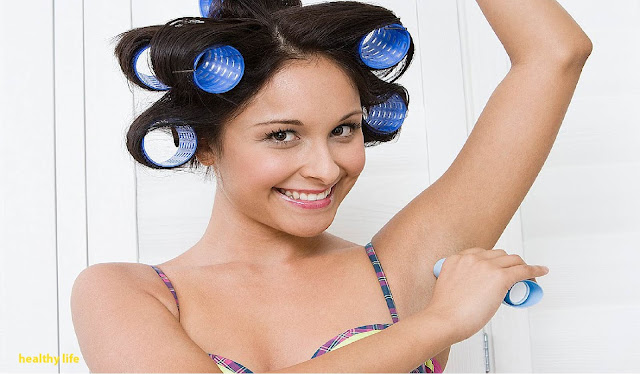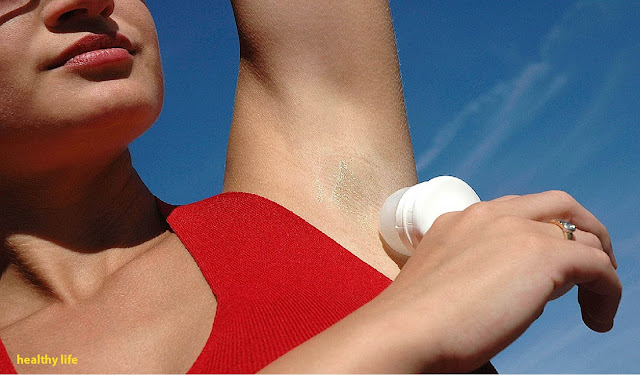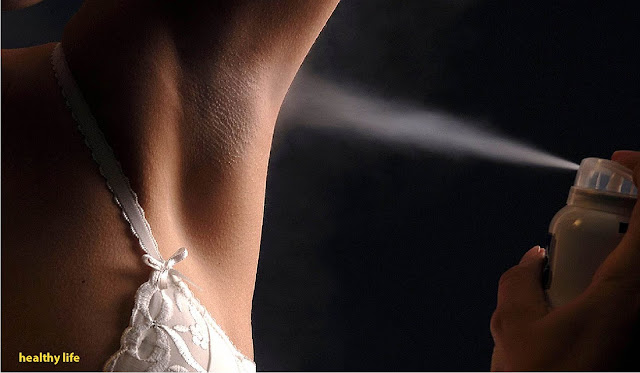 |
| dangers of deodorants |
dangers of deodorants
We try to protect ourselves from sweat with their help, believing that we maintain hygiene. But in fact, every day we expose ourselves to serious risk
Every day we use deodorants or antiperspirants. It's time to find out how they effectively protect against sweat and how they can be harmful to us.
Antiperspirant or deodorant?
Deodorants are cosmetics that kill bacteria that inhabit our skin. It is thanks to the products of the vital activity of bacteria that sweat has such an unpleasant odor.
Deodorants do not affect sweat.
An antiperspirant is a drug that blocks the ducts of the sweat glands, thus reducing sweat. And there is no sweat - no odorous bacteria.
Why can sweat products be dangerous?
“The food we eat is processed in the gastrointestinal tract and liver,” said biologist Heather Patisol, a professor of biology at the University of North Carolina, USA. “But if we apply a chemical substance to the skin, it is immediately absorbed into the bloodstream, without being processed or rendered harmless.”
Of course, not all substances that we apply to the skin reach the bloodstream. It all depends on their chemical characteristics. However, blood tests of persons using deodorants and antiperspirants indicate that the components of these agents are actively absorbed through the skin and are found in the blood.
- Studies confirm that some components of antiperspirants can not only be absorbed through the skin, but also settle in fat cells. And there are quite a few such cells in the armpit, ”says Philip Harvey, editor-in-chief of the Journal of Applied Toxicology.
In addition, hormonal receptors are found in large quantities in the skin of the armpits. They are more likely to respond to some chemical components of deodorants. Experts are concerned about the widespread use of sweat products. After all, their interaction with hormonal receptors can affect the reproductive function of men and women, as well as increase the risk of developing various types of cancer.
Consider 5 harmful components of deodorants and antiperspirants.
Parabens
Parabens play the role of preservatives in various deodorants and antiperspirants. Studies show that some of them affect the production of various hormones, including estrogen.
- The mammary gland is sensitive to estrogen. Therefore, there are certain concerns. After all, antiperspirants and deodorants are applied quite close to the gland. And chemicals can stimulate the growth of cancer cells, explains Professor Patisol.
Moreover, this applies equally to both men and women.
According to the American National Institute of Oncology, there is no unequivocal evidence of cancer dependence on parabens. But some laboratory data are alarming. The results of research by Philippa Darbr, an oncologist at Reading University (UK), showed that a mixture of various parabens increased estrogen production.
- However, the formation of a cancerous tumor is a complex multi-stage process. It can take several years to grow, ”explains Dr. Philippa Darbr. - In order to prove the presence of a unique ligament of parabens = cancer, additional studies are required.
And yet she says, choosing her words carefully: prolonged use of parabens "can lead to cancer."
Aluminum
Aluminum is part of antiperspirants. This metal causes the "instability" of the genes of breast tissue. Such instability can lead to changes that lead to the formation of cancer cells.
“More than 50% of breast tumors are located in the upper outer quadrant, that is, closer to the armpit,” explains oncologist Philippe Darbr.
But again: there is no absolute evidence that aluminum is the direct cause of cancer. Such allegations require additional research.
Triclosan
Manufacturers of cosmetics add this substance to many products in order to prevent their contamination with bacteria. Triclosan is also added to acne remedies, as well as some deodorants, antiperspirants and bactericidal soaps in order to prevent the growth of bacteria on the skin.
The substance is so common that it is found in urine in 75% of Americans. The U.S. Food and Drug Administration (FDA) has so far considered triclosan safe.
However, new studies have come up that cast doubt on this confidence. During experiments on animals, it turned out that triclosan causes an unusual activity of hormones. Other works talk about the ability of a substance to interact with the intestinal microbiome and even affect the functioning of genes.
“In fish and amphibians, triclosan reduces the thyroid function, which is so necessary for the functioning of the brain,” says Dr. Patisol.
Phthalates
These components help deodorants and other cosmetics linger on the skin for a long time. As it turned out, phthalates are able to disrupt the function of male hormones - androgens. That is how the body produces and uses the hormone testosterone.
Perhaps many of you believe that testosterone is exclusively a male hormone. However, this is not quite true. Testosterone is also formed in the body of women. Its function is to be responsible for tone and muscle strength.
“Particularly dangerous is the fact that phthalates can reduce male reproductive function and adversely affect the development of the fetus in women,” says Dr. Patisol. - These substances can increase the risk of asthma and even lower IQ.
Phthalates are usually found in all products with an aroma that lasts for some time. That is, it’s all means, starting with shower gel and shampoo, ending with hair spray and soap.
Various flavors
Each cosmetic product has its own "aroma" or "perfume", which is part of its ingredients. It is impossible to know exactly which chemicals are hidden under these seemingly harmless names. After all, the composition of the perfume is protected by a trademark.
“They can include phthalates or even allergens that cause a skin reaction,” says Dr. Patisol. - Even inhaling scented cosmetic products in some people can cause allergies.
What else can be saved from the bad smell?
Alum
Burnt alum was used as a remedy for sweat in ancient Egypt, China and other Asian countries. It is a mountain mineral, a mixture of aluminum and potassium salts. Unlike antiperspirants, alum does not block the sweat ducts, but absorb excess moisture.
Due to the presence of acid, they have a bactericidal effect and can get rid of smelly bacteria. In addition, alum allows you to get rid of fungi, and also have anti-inflammatory properties.
When applied to the skin, alum forms a thin film that is permeable and does not interfere with perspiration. Many dermatologists consider alum to be a safe remedy for sweat, to which there are practically no contraindications. They can be used by pregnant and lactating women. However, individual intolerance may develop to them. People with hypersensitive skin are not recommended to use alum.
Weekly antiperspirant
They need to be applied only 1 time per week, and manufacturers promise the effect within seven days. Clinical studies and user reviews have confirmed its effectiveness. That is, indeed, sweat in the axillary region ceases to be released within 6-7 days. But, as it turned out, this is not a panacea: the production of sweat in the axillary zone stops, but moisture is intensely released on other parts of the body.
The composition of the antiperspirant includes denatured alcohol and aluminum chloride hydrate. But, if aluminum is 10% in conventional antiperspirants, its content in the weekly is 30.5%.
In most cases, the antiperspirant did not cause side effects. In rare cases, allergies, itching, dryness at the site of application. However, a high content of aluminum cannot remain harmless to the body. Salts of this metal can cause inflammation of the lymph nodes and severe itching. All antiperspirants are contraindicated during pregnancy and lactation, as they can have a harmful effect on the mother and baby.
HOW TO USE: TOTALLY NOT OBVIOUS RULES!
- Antiperspirants should be applied to clean, dry skin in the evening after a shower.
The fact is that the chemicals in its composition need to have time to absorb and block the ducts of the sweat glands - only then the tool will begin to work. That is, if you are smeared with a stick in the morning after a shower, until it gives effect, you will already sweat and start to smell. In addition, on insufficiently dry armpits, the product can simply roll up and will not fall into the depths of the skin.
- Do not apply antiperspirant to large areas of the body before doing sports. So you block the sweat. But the body eventually overheats - after all, with the release of sweat, the process of thermoregulation occurs. And you, good luck, acne may occur in these places.



Am so happy, i never believe i will be this happy again in life, I was working as an air-hoster ( crabby crew ) for 5 years but last year i loose my job because of this deadly disease called HIV and Herpes(herpes and cold sore outbreaks), I never felt sick or have any symptom, till all workers were ask to bring their doctor report, that was how i got tested and i found out that am HIV and Herpes positive that make me loose my job, because it was consider as an STD and is incurable disease, i was so depress was thinking of committing suicide, till i explain to a friend of mine, who always said to me a problem share is a problem solved, that was how she directed me to this Doctor Called Dr Aziba , that was how i contacted him and i get medication from him and i got cured for real, I just went back to my work and they also carry out the test to be real sure and i was negative. Please contact Dr Aziba if you are HIV And Herpes or any kind of disease you got infected with do contact the Herbal Doctor via his Email ( priestazibasolutioncenter@gmail.com ) or call or via Whatsap[ +2348100368288 ]
ReplyDeletedoctor is a life saver.